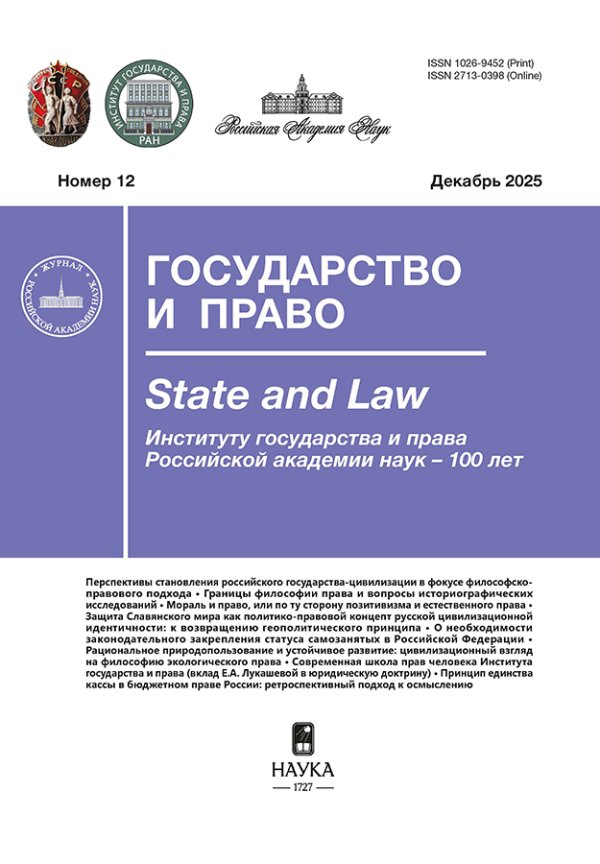О Высшем органе судебной власти Российской Федерации
- Авторы: Клеандров М.И.1
-
Учреждения:
- Институт государства и права РАН
- Выпуск: № 8 (2023)
- Страницы: 51-63
- Раздел: Дискуссии и обсуждения
- URL: https://journals.rcsi.science/1026-9452/article/view/141261
- DOI: https://doi.org/10.31857/S102694520027226-9
- ID: 141261
Цитировать
Полный текст
Аннотация
В статье обосновывается необходимость создания в Российской Федерации принципиально нового конституционного государственно-властного органа под условным названием Высший орган судебной власти РФ, аналогично тому, что высшим органом законодательной власти является двухпалатный парламент, а исполнительной власти – Правительство РФ. Отмечается, что подобные органы есть примерно в половине государств мира, да и в России он вполне реально мог появиться дважды – в 1993 г. и в 2001 г. Обосновывается отсутствие возможности возложить функции этого органа на Верховный Суд РФ и на иные органы государственной власти и органы судейского сообщества. Высшему органу судебной власти предлагается дать правомочия по обеспечению независимости судов и судей, материально-ресурсному, финансовому, кадровому и иному обеспечению эффективной правосудной деятельности судебной системы. Для чего предлагается наделить этот орган правами: а) законодательной инициативы; б) принятия необходимых, обязательных к исполнению конкретным кругом исполнителей нормативно-распорядительных правовых актов. Предлагаются контуры формирования этого органа. Жестко отмечается, что Высший орган судебной власти ни в коей мере не будет являться судебным органом – любой юрисдикции и какой-либо инстанции. Подчеркивается, что реализация данных предложений потребует разработки и принятие новой Конституции РФ.
Ключевые слова
Список литературы
- Алексеевская Е.И. Законы развития судебной системы. М., 2016.
- Большой словарь иностранных слов / сост. А.Ю. Москвин. М., 2003. С. 314.
- Из истории создания Конституции Российской Федерации. Конституционная комиссия: стенограммы, материалы, документы (1990–1993 гг.): в 6 т. (10 кн.) / под общ. ред. О.Г. Румянцева. М., 2008. Т. 4: 1993 год. Кн. 1 (январь-апрель 1993 г.). С. 415; кн. 2 (май-июнь 1993 г.). С. 523, 741; 2009. Т. 5: Альтернативные проекты Конституции Российской Федерации (1990–1993 гг.). С. 927, 929.
- Капустин О.А. Организация судебной деятельности в современный период: автореф. … канд. юрид. наук. М., 2022.
- Кельзен Г. Что такое справедливость? Справедливость, право и политика в зеркале науки / пер. с англ. под общ. ред. М.В. Антонова. СПб., 2023. С. 6.
- Клеандров М.И. Механизм этической ответственности судьи: проблемы формирования. М., 2017.
- Клеандров М.И. О Совете судебной власти Российской Федерации. М., 2016.
- Клеандров М.И. Судейский корпус России: совершенствование механизма формирования. М., 2019.
- Клеандров М.И. Судья или не судья: об институте ничтожности судебного акта // Росс. правосудие. 2016. № 12 (128). С. 29 - 38.
- Митюков М.А. В поисках обретения Конституции: от Конституции РСФСР 1978 г. к Конституции Российской Федерации 1993 г.: документально-монографическое исследование. М., 2021. С. 358, 359.
- Митюков М.А. Конституционное правосудие на втором этапе развития (к историографии вопроса с позиции конституционалиста) // Конституционное и муниципальное право. 2020. № 2. С. 5.
- Франческа Фьеккони. Независимость и качество правосудия: сравнительные перспективы. Итальянская республика // Сравнительное конституционное обозрение. 2017. № 1 (116). С. 95, 96.
- Чеботарёв Г.Н. Принцип разделения властей в конституционной системе Российской Федерации: автореф. … дис. д-ра юрид. наук. Екатеринбург, 1998.
Дополнительные файлы










